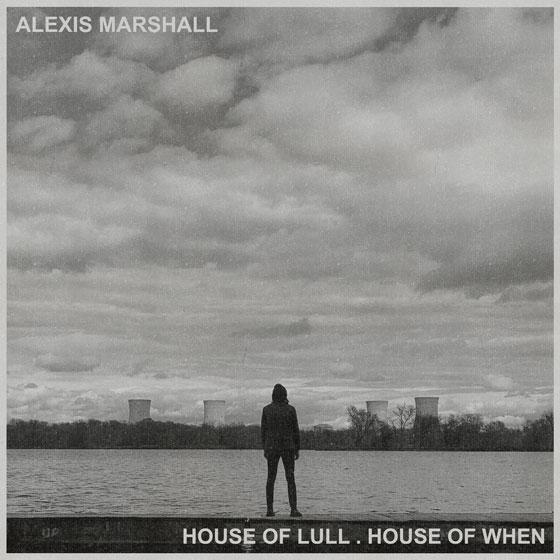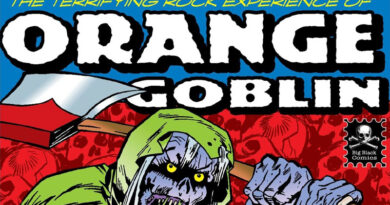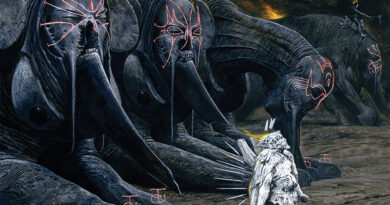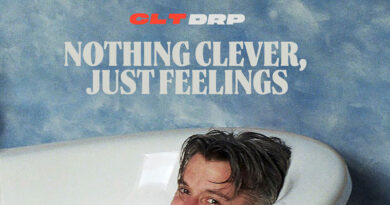Review: Alexis Marshall ‘House Of Lull . House Of When’
How extraordinary the second act of Alexis F Marshall‘s musical career has been. Daughters were, in their initial run, a fine band, a grotesque and notorious blossoming corpse flower from hardcore roots with a notoriety for Marshall‘s excesses, as much as their jagged music. Since their return a few years ago that introduced a more mature and concentrated, yet no less wild approach, they’ve pulled off the rare trick of being better in their reincarnated state.

With this newfound focus, limited not just to the band’s music, but to their frontman himself, Marshall has become one of the most magnetic and fascinating performers of our current era. Stylishly dressed on the outside, seemingly driven by some unknowable, possibly demonic, force on the inside, I’ve witnessed the man effortlessly balance a sense of genuine connection with his audience, and blatant disregard for his own bodily safety. The last show I saw before the world ground to a halt was Daughters. It was incredible. Marshall performed like it was the last time he would ever do so.
And here he is, eighteen months or so since that tour, channelling all the fire, intensity and passion of his live performance into a studio recording. It’s monstrously physical, screaming at me ‘Don’t Get Up, Don’t Look At Anything, Don’t Touch Anyone, You Are Expected To Meet Your Obligations, Stay Where You Are’, externalising the panic driven internal monologue myself, and millions of others, have sought to avoid with the same rage and absolute terror we’ve all felt.
Mutated percussion collapses around his increasingly desperate voice. In the space of about four minutes, a perfect musical summary of two years of living in stress and fear has been delivered. And it’s a glorious thing. This is assuredly not a Daughters record. This is Alexis Marshall creating a strange and frightening world of possibilities of his own. There are sonic parallels here, inevitably the percussion/voice tag team basis summons the ghosts of PIL’s Flowers of Romance, early Neubauten and Swans, with perhaps the more recent spectres of Sword Heaven, and Scott Walker at his most abstract, hovering over proceedings approvingly. Marshall and company however do not ape, or steal, from any of these artists, more reflect on the possibilities offered and run carefree into the darkness with them.
Perhaps it’s key to note that the first sound you will hear on House Of Lull. House Of When is not a voice or instrument, but (if you listen carefully enough – and I strongly recommend you get the headphones out to enjoy this whole album) what appears to be the faint sound of a door closing and some footsteps; literally the start of a journey. You begin at the same point as Marshall walks you through the whole ordeal.
It’s interesting to view the first track, Drink From The Oceans. Nothing Can Harm You, and closer, Night Coming, as clear prologue and epilogue, both operating in a slighter more grandiose and sombre manner than much of the album. In both cases you can close your eyes and easily imagine Marshall on a rooftop at night, looking across the city below, alternately calling out to, and muttering asides, at the artificially lit streets below. ‘I am here’ he repeatedly cries out in Drink…, declaring himself to the world. By Night Coming eight tracks later, his precise words are hard to make out in layers of increasingly fuzzed piano and drone, his tone is weary, yet ominous. It’s a silly analogy perhaps but it’s as if he’s gone from the Joker to Batman in two songs.
an album of nightmarish industrialism that’s deeply engaging with a very human core…
What happens in between these twin pillars of musical night? A lot. Marshall, in association with fellow Daughter Jonathan Syverson, multi-instrumentalist Evan Patterson (aka Jaye Jayle), and what appears to be a hefty haul from a local hardware store and builder’s yard, construct a sound world of collapsing ceilings and twilight rooms. Literally. Much of the music is like being in a building, perhaps specifically a semi abandoned factory. Abrasive and laced with paranoia, it’s genuinely frightening at points.
The bulk of the songs are led by percussion, I won’t say drums as it’s about as far from a traditional kit as you can imagine – and certainly no drumkit I’ve heard sounds like this. Whatever is being used as a bass drum, it’s the most chest bursting piece of kit I’ve heard in some time, and fair dues to producer Seth Manchester for capturing the various poundings, rattling’s and shattering’s with almost painful precision. Patterson adds textures and further instrumentation to compliment the mood of Marshall‘s delivery perfectly, be it though his inventive guitar mutilations, the black cloud piano, the Twilight Zone inflections of the purgatorial lament No Truth In The Body, or the stroboscopic sax nightmare of It Just Doesn’t Feel Good Any More.
Make no mistake, while the other musicians are essential to the finished project, this is very much Alexis‘ album, his words aren’t simply thrown haphazardly over a bunch of random sounds. The care taken, in terms of the tone and cadence, in his delivery has more in common with the best rap, as a non-melodic vocal performance, to establish a mood and convey an emotion.
He could be singing absolute gibberish on Hounds In The Abyss or They Can Lie There Forever and as long as he attacked it in the same manner, his performance would still connect. He chooses his words carefully – the man is a published poet after all – but his delivery is just as considered, and several fragments of lyrics echoed around my brain for days after the first few listens. No greater illustration of his skills is there than in the mid album duo of Youth As Religion into Religion As Leader, where an almost identical set of lyrics are delivered to two very different effects.
House Of Lull. House Of When is, you will have gathered, a very uneasy listen. Scathing, cathartic, dread-filled and yet somehow thoughtful, Marshall & Co have created an album of nightmarish industrialism that’s deeply engaging with a very human core. It’s alienating music that doesn’t, I think, seek to alienate on purpose, but rather like the man himself, bravely presents itself without concern for the reception that will follow. I don’t think a second or third Alexis Marshall album will sound remotely like this one. And we should all be excited about where he goes next. Remarkable stuff from a remarkable artist. ‘What a time to be alive in this world before the next’ indeed.
Label: Sargent House
Band Links: Facebook | Bandcamp | Instagram
Scribed by: Jamie Grimes



